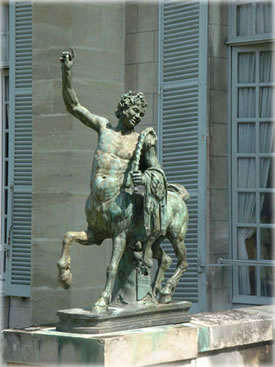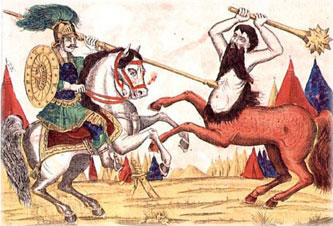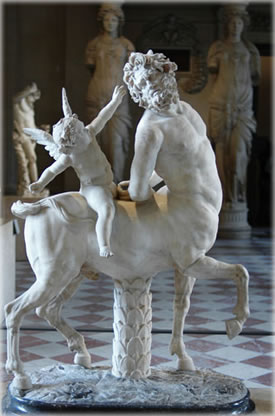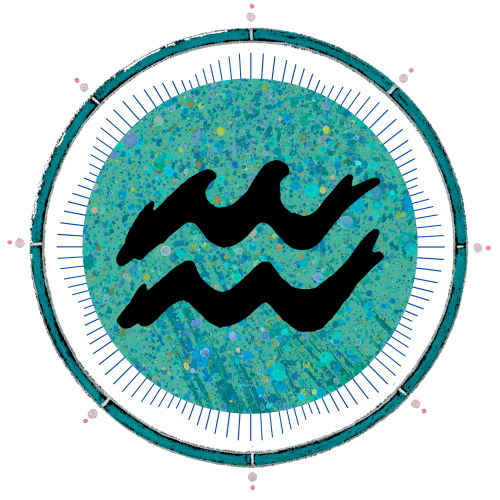By Eric Francis
WAY AT THE BEGINNING, someone named Al Morrison summed up Chiron brilliantly, if incompletely, when he called it the ‘inconvenient benefic’. Chiron nearly always bestows a profound gift, though it may seem an annoyance at the time; it will save us over and over, waking us up just in the nick of time; but the events surrounding it almost always seem a bit shocking as they occur. Though over time, a degree of mastery of Chiron’s most fundamental energy may be attained: and that energy is awareness. Awareness is almost always inconvenient at first.

This quality extends through all the Centaur planets which arrived after Pholus (the second Centaur) was discovered in 1992; each makes us aware of something different, and each helps us reclaim some cast-off aspect of our existence. They all point to what are typically unnoticed cycles of our lives, thereby calling attention to patterns of changes we might otherwise have missed.
Chiron has an orbit of 50 years. It is elongated such that at one end, Chiron will move through Virgo and Libra in about 18 months each, while at the other, it will move through Pisces and Aries in about 9 years. This means that at one phase of history people can have a key Chiron transit (such as Chiron square its own natal position) as young as seven and as old as 23. Typically the greatest variances in the orbital pattern are between parents and children, and the greatest similarities are between grandparents and grandchildren.
Some say the basic nature of Chiron is about healing, but if that is true, awareness is the most frequent agent of that process. Melanie Reinhart gives the keyword transition; when awareness changes, that is inherently a transition. Chiron may arrive in the form of a practitioner who assists with a change or healing process, and what most healers teach is awareness, principally self-awareness. This often arrives in the form of change, and what change most often teaches us is awareness.
This was well understood at the time of Chiron’s discovery in 1977, when there was still such a thing as the Human Potential Movement: a secular (not spiritual) movement that involved people teaching one another to be aware, holding the space for one another to own their faults and virtues and to take responsibility for their lives as a conscious act. Chiron remains a living agent of the Human Potential Movement, or more accurately, of any movement devoted to expressing human potential.
Anyone who has tried knows how difficult this usually is. We encounter the maxim love brings up everything unlike itself. We meet those who assist us in our transition consciously and effectively; they are Chirotic in nature. We meet others who assist us through some process of injury and they are Chirotic if we use that injury to transcend being a victim. We also meet healers who wound, who are one of the most common manifestations of Chiron’s shadow side.
Perhaps if humanity were not so intent on denying its awareness, ignoring its knowledge, suppressing its potential and investing its energy in greed, Chiron would feel gentler or not be necessary at all. Perhaps if we considered understanding and embracing our shadow nature as important as seeking the light in our spiritual pursuits, we would not need Chiron. If it were more encouraged to allow curiosity its place, and to let it be a teacher, we would not depend so heavily on Chiron to instigate the experiences and crises we need to learn and grow.
Perhaps if we counted ourselves among the animals we possess, abuse, hunt and consume, connecting with the wounded nature of Chiron’s animal being — in the myth, his lower body is afflicted — would not be so difficult. Yet religion, in teaching us to deny our animal nature, has in a sense trapped us in our shadow nature; our minds cast a long shadow over our bodies. Chiron fundamentally addresses the mind-body split from which so many people suffer. Almost all events or developments involving Chiron can be seen in terms of mind/body divisions. Typically any healing associated with Chiron can arrive in the form of becoming aware of those divisions.
The most poignant example of such injuries can be seen is in our approach to sexuality in Western culture. We crave sex; we romanticize it; we exploit it for every possible purpose; we demonize it and make it a crime. Then, based on the lack of awareness necessary to make any of that happen, we get caught in the injuries of guilt, possession and jealousy. We can, understandably, confuse guilt and jealousy with sexuality itself.
If, under the influence of a Chiron transit and its accompanying events, we investigate these things, we might confuse the shadow material that emerges with Chiron itself, and not view Chiron as the source or metaphor for the awareness that is helping us be free. The ultimate goal of any Chiron process, or perhaps any life process, is attaining freedom, and freedom is most meaningfully experienced as the freedom to make a conscious decision.

Chiron is about integrating the experiences that make us aware of ourselves, our role in the community and our relationships with others. In this respect, the way to understand Chiron is not by book learning or astrological theory, but rather by investigating the events associated with Chiron transits, and our responses to them. Just as with a homeopathic remedy, there is no one interpretation of any Chiron placement, transit or experience. Some theory is helpful, but Chiron is primarily a workbook. The astrology student working on her own chart, or the astrologer serving a client, will get the necessary knowledge about a Chiron placement by listening carefully to the events from a series of several Chiron transits, noting the common threads and finally, noticing the direction of the overall movement.
Appropriate questions relating to these transits include, ‘What did you learn?’, ‘What did you become aware of?’ and ‘What are you aware of now?’
Chiron teaches through direct knowledge, a thing almost unheard of in our current era of history. Traditional astrologers who say they have difficulty grasping Chiron probably have this trouble because they are trying to get it in theory first, rather than through what we and our clients learn from real-life developments.
It is best not to think of Chiron as a planet to be interpreted but rather as a sequence of events in a lifetime, going back to childhood or before. These events both teach values and describe a growth process.
What you have in the above paragraphs is more than enough theory to apply Chiron in astrological practice. No books are necessary; if you check the transits of Chiron — to its own natal position; to the ascendant and other angles; and to key points in the chart — you will get a sense of the process in that individual. It may be possible to understand the transition or struggle for consciousness involved, and intuitively sense the next step; that is, if you are listening carefully for clues to what is happening beneath and behind the story line. Look for motives and how they manifest; choices and how they end up and what just seems to happen as time goes on. You are not just looking for a litany of the past. You are looking for patterns, and for some expression of how the person feels about the past in the present, as if it were still a living thing.
Through this process of awareness-raising, we can begin to tap into some of the promise of Chiron’s discovery degree, 4 degrees of Taurus, which is ‘the pot of gold at the end of the rainbow’ — that which links the celestial and mundane orders of reality, or, translated in to human terms, the mind and the body, which are connected by awareness.
Chiron In the Natal Chart
The typical quality of one’s natal Chiron might sound like this. It’s a place of obvious focus, sometimes success, often what you could call productive struggle. Fritz Perls referred to the power of frustration as a teacher, and this is often how natal Chiron feels. One of two things occurs frequently: unusual power gathers there, special talent, an exception granted or unusual knowledge gained; or there is repeated injury. All together, these comprise a process of experience and learning.

This locus of experience will typically take on the qualities of the house placement. The person may not feel particularly strong there; it may seem like a point of special weakness. The sign placement will provide a kind of filter and show the contact between the individual experience (the house) and the collective (the sign). The sign will also show something of the style of the expression.
The placement will be expressed, seemingly blocked or modified by the aspects involved. While these are cataloged in some books, careful listening to circumstances at the time of Chiron transits will reveal the nature of the natal position and the aspects. In general, we could say that Chiron will try to raise an unconscious Pluto process to full awareness; it will tend to focus the diffuse experience of Neptune; it will ground the radical changes of Saturn in some tangible form; and it will give a clear expression to the wisdom and experience-seeking of Jupiter.
Where an inner planet is involved, the developing and expressing the quality of that planet will be intensified, as if it’s cracked open and some element of its nature is allowed to come out; it will tend to dominate the life, though in different ways at different times.
Chiron energy can often express itself as a helping or teaching role in the community. You get everything from acclaimed masters to exemplars on many levels to people who don’t remotely practice what they preach. In a sense, all are at different points along the same path, and if Chiron is involved, you can be pretty sure that the damage of any negative expressions will be limited and events will point someone in the direction of growth, progress and mastery — no matter how gradual it may seem.
Events and developments at the time of transits to Chiron’s natal position will bring up situations that express the nature of the natal placement. The natal themes and the transit themes are closely related, perhaps more so than with any other planet. The fundamental experience of developing and focusing consciousness of the natal placement will persist, seeming to reach peaks at the time of the transit, and in the process entirely new levels of expression can be attained.
When Chiron is on an angle natally, it can connote a crisis that is existential, that is, having a life or death quality, or seeming to relate to a struggle for the right to exist. The ability to ground the process of Chiron in a conscious and productive way seems to be related to whether the aspect pattern is connected to the angles or not. If there are not aspects to the angles, Chiron will feel like something in the background without a name. To gain access to the process, the astrologer will need to do a little more teaching and a little more pointing to how certain key experiences connect to Chiron themes.
Now, it is arguable that the process of cultivating awareness happens on some level with every planet, but more accurately we could describe Chiron as reflecting the process of astrology itself. Astrology seems to involve little other than learning to pay attention. A bunch of weird glyphs are involved, true. But as anyone who has studied astrology for an hour knows, most of what we do is try to become aware of what they are saying.
Basic Astronomy of Chiron, and its Application
The discovery of Chiron came with the advent of astrologers and astronomers working together cooperatively for the first time in centuries, building the first bridge of many that Chiron would become associated with.
Brian Marsden at the Minor Planet Center at Harvard University gave Zane Stein an ephemeris for Chiron, and the process of its continuing discovery was begun. Later in the Centaur discovery process, this would continue with Stein, Melanie Reinhart and other astrologers assisting astronomers. Chiron also marked a time when an increasing number of astrologers began taking up their role as cultural astronomers.
Some astrologers would recognize that delineating a new planet would require them to be aware of more science than they previously had ever done and also more classical scholarship. By the late 20th century we had Centaur astrologers who were experts in classics and could interpret ancient Greek, program the ephemerides of these distant planets, and develop original interpretations.
The first keyword for Chiron was assigned by its discoverer, Charles Kowal, when he said, “This thing is a maverick.” He was not intentionally handing this to astrologers, but it was a great gift. Chiron fit no known category of planet; it was not orbiting in a known orbit and crossed the orbits of other planets, and there was nothing quite like it. He named it after a hybrid between a man and a horse, resurrecting a nearly forgotten myth and as it turned out, an entire body of then-obscure folklore.
Chiron was actually the second planetary discovery to be an orbit-crosser: it was by the time of the discovery known that Pluto crossed inside the orbit of Neptune. Chiron, for its part, crosses inside the orbit of Saturn and reaches out nearly to the orbit of Uranus. It has an elliptical orbit and moves as slowly as Uranus at its slowest (near aphelion, in Aries, it takes nine years to cross a sign) and considerably faster than Saturn at its fastest (near perihelion, in Libra, it takes 18 months).
This Saturn-Uranus connection provided one of the basic ideas for understanding how Chiron connects the distinctly different experiences of the structured material world (Saturn) and the energized world of change, progress and revolution (Uranus). It was perhaps the first planet to be discussed specifically in terms of its astronomy, and for sure the first where the discovery chart was used consciously in the delineation of the planet.



